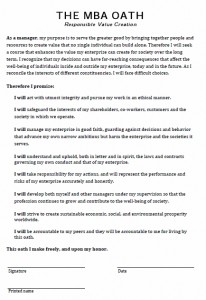When Lauren Mehler took The MBA Oath this spring, she saw it as a way of holding herself to a higher degree of accountability. Putting her name to the oath during her final semester at Harvard Business School was a public acknowledgment that when, in her working life, she faces a difficult decision with no clear right or wrong, she will think through which course will “serve the greater good.”
 Mehler, daughter of Mark Mehler, a founder and principal of the well-known recruiting consultancy CareerXroads, joined hundreds of her fellow Harvard MBA students in signing an oath vowing to “seek a course that enhances the value my enterprise can create for society over the long term.”
Mehler, daughter of Mark Mehler, a founder and principal of the well-known recruiting consultancy CareerXroads, joined hundreds of her fellow Harvard MBA students in signing an oath vowing to “seek a course that enhances the value my enterprise can create for society over the long term.”
Although other schools have tried oaths or pledges for their business school students, this one was the brainchild of a few of Mehler’s student colleagues. “Business schools have been demonized,” she told us recently, as she was preparing to leave home for her job in Minneapolis. Whether rightly or wrongly, they have been blamed for failing to instill a moral compass in the MBAs they turn out, who, in turn, have been blamed for the current recession as well as most of the excesses of Wall Street and the banking community at large.
“We had a lot of discussion about the recession and the conditions that lead up to it,” she told us. “The ethical situations were discussed in every class I had.”
Some of the students, however, believed they needed something more.
As Mehler points out, “Most professions have some ethics or licensing group.” Nothing equivalent exists for business, which is what lead a group of students to come up with a declaration of principles they hoped would eventually be signed by 100 members of the Harvard Business School class of 2009. On graduation day, more than 400 took the oath at a student-organized ceremony before the official exercises.
Articles in The Economist, The New York Times and elsewhere make much about the oath being a renunciation of greed. But the eight promises in the oath include no vow of poverty. Instead, they talk about considering the interests of society as a whole and taking personal responsibility for decisions and actions.
“If this is a way to stop an individual from a making a decision that will harm others, great,” says Mehler, who who observes that the oath creates a moral contract with oneself and the other students. “When you swear an oath,” she explains, “it makes you pause; think about the stakeholders.”
When a difficult decision with an ethical component arises, Mehler says the oath will serve as a reminder to weigh all the consequences. “You sort of sit and tell yourself: This is a gray area.”
Since starting at Harvard, students at other schools have signed on to it. Today, more than 1,300 MBAs have publicly declared thier commitment to its principles.
Whether the oath and its eight promises will survive the rough and tumble of the business world outside of Harvard Yard remains to be seen. The Economist article talks about the oath being “part of a larger effort to turn management from a trade into a profession.” The author of the article notes the difficulty in achieving that goal, especially in light of the regard business schools give to Nobel economist Milton Friedman who wrote in his book Capitalism and Freedom, “There is one and only one social responsibility of business — to use its resources and engage in activities designed to increase its profits so long as it stays within the rules of the game, which is to say, engages in open and free competition without deception or fraud.”